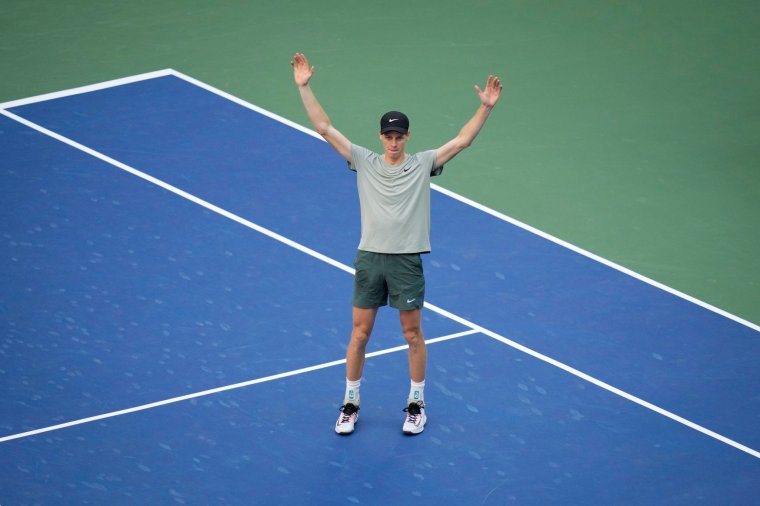Jannik Sinner closed out grand slam season on Sunday night with a dominant victory over Taylor Fritz, winning the US Open final 6-3, 6-4, 7-5 in two hours and 17 minutes.
Perfection is a rarity in tennis. In hard-court majors this year, Sinner has managed it with 14 match wins and no losses. Having deposed Novak Djokovic at his second home in Melbourne, he won three more hard-court titles and then made it five in total with victory in New York, dropping just two sets in the process.
Since both Australian and American grand slams have been played on a hard surface – the Melbourne edition moved from grass in 1988 – only three men have previously won both in the same year: Mats Wilander (once), Roger Federer and Djokovic (both three times).
The first time Djokovic did it, he was 24 years old. Federer was 23 as Sinner is but the most recent member of this special club is a week younger than the Swiss was then.
He is on an impressively steep gradient and given this is the first time in 22 years that one of the Big Three (Federer, Djokovic and Rafael Nadal) has not won a major, Sinner is more than deserving of a mention in the same breath as those legends. He is as good as this new era, Carlos Alcaraz aside, has got to offer.
Only two men have beaten the Italian world No 1 on hard courts this year – Alcaraz in Indian Wells and Andrey Rublev in Montreal – and both were hard-fought three-set affairs.
It is indicative of how Sinner has established himself as the dominant force on tennis’s most prevalent surface, starting probably with his defeat of Djokovic in Malaga.
Sinner had been spanked by the Serb at the ATP World Tour Finals 6-3, 6-3, and just a week later wearing the colours of his country in the Davis Cup, Sinner turned it around.
It wasn’t easy – he had to save three match points – but the resilience he showed on that occasion seems to have inspired something in him. In the nine months since, he has only lost five matches.
“He can play any opponent on any surface and we think Jannik Sinner is the favourite at the moment at this stage of his career and he is only going to get better,” said Wilander, now a Eurosport tennis expert.
“He is only 23 and didn’t play as much as a junior which means he is so fresh. His popularity will continue to grow because he is so humble as a sportsperson.”
There are shades of the Andy Murray in Sinner. Like Murray, he is not a natural extrovert, instinctively shy and a bit of a tennis nerd.
“Is playing tennis all he does? I just don’t understand. At 19, I was drinking a beer,” said Alexander Bublik of Sinner when he first started moving up the rankings.
Sinner says he doesn’t really like drinking, and Murray tends to avoid it except for on special occasions – although after he won Wimbledon he was sick in his taxi home.

And like Murray, it may take people time to warm to Sinner. Those who deal with him every day say he is a polite young man, well-liked in a notoriously duplicitous locker room.
His public persona is an inoffensive one, but also a little dry. Murray’s shyness in the early years was mistaken for hostility and dourness, his dry sense of humour failing to land, almost getting him in trouble on several occasions.
But Sinner has a dedicated fanbase who already know how much fun following him can be, and success will only grow its size.
In comparison to Alcaraz, the player whom Sinner will surely form a storied rivalry over the coming years, there is no harm in Sinner being the strong, silent type, a foil to his Spanish foe’s broad smile and occasional hot-headedness. Ali vs Frazier, Borg vs McEnroe, Federer vs Nadal: contrast is the key to those great double acts.
It should also not be forgotten that Sinner has done all of this under the most powerful of microscopes: the pre-tournament disclosure of two positive drugs tests, taken back in March, and the subsequent absolution from blame, sent the tennis world into meltdown over the perceived favouritism of allowing world No 1 Sinner to fight the charges in secret.
“This title for me means so much because the last period of my career was really not easy,” Sinner said afterwards. “My team and the people who are close to me have supported me every day.”
There is no suggestion that Sinner himself has done anything wrong – he fired his physio and physical trainer after it was found that a medication one had bought and the other had used (on his own body to heal a cut) was the source of the banned substance.
He has though had to bear the brunt of a great deal of misdirected anger at a dysfunctional anti-doping system while also trying to win his second grand slam.
For a relatively slender man, Sinner has shown his shoulders to be impossibly broad.




Maurice Saatchi: I used to adore capitalism – then I had lunch with Margaret Thatcher